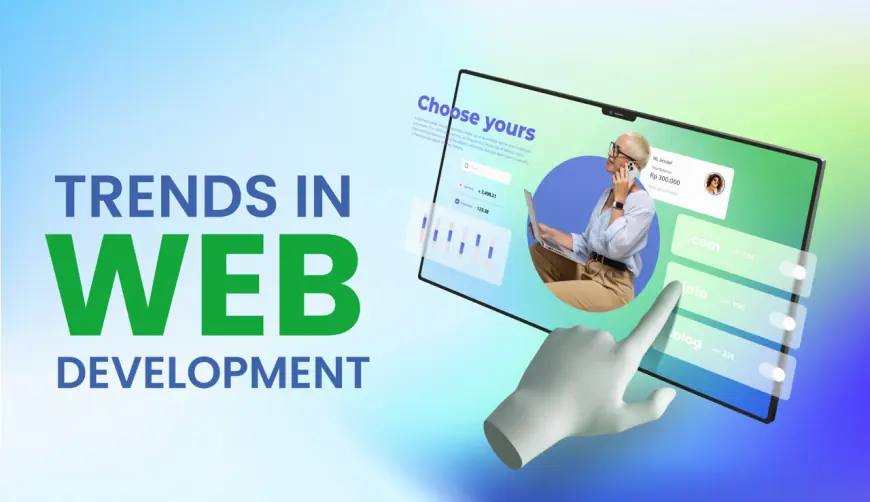The Future of Web Development and SEO : What’s Next?
Explore the future of web development with insights on emerging technologies, trends, and techniques that will shape the digital landscape. Stay ahead of the curve!

The landscape of web development and search engine optimization (SEO) is in constant flux, driven by technological advancements, user expectations, and evolving search algorithms. As we look toward the future, it’s essential to explore the trends and innovations that are shaping how websites are built, optimized, and ranked in search engines. This blog delves into the future of web development and SEO, examining key trends that will play a pivotal role in shaping the digital landscape.
1. The Rise of AI and Machine Learning in Web Development
Artificial intelligence (AI) and machine learning are transforming web development by enabling developers to create smarter, more adaptable websites. AI-powered tools can automatically optimize website performance, analyze user behavior, and generate personalized experiences based on individual preferences. This shift means that developers will increasingly rely on AI to handle mundane coding tasks, allowing them to focus on more complex issues like user experience and design. As websites become more intelligent, they will cater to specific user needs, potentially enhancing engagement, conversions, and retention rates.
2. Progressive Web Apps (PWAs) Revolutionizing User Experience
Progressive Web Apps (PWAs) are blurring the lines between web and mobile applications, providing users with fast, reliable, and engaging experiences. PWAs leverage modern web capabilities to deliver a user experience similar to that of native apps, including offline functionality and push notifications. As web development continues to evolve, PWAs will become an essential tool for businesses looking to connect with users on various devices while enhancing load times and accessibility. This trend will inevitably impact SEO, as search engines increasingly favor sites that provide exceptional mobile experiences.
3. Voice Search: A New SEO Paradigm
With the growing prevalence of smart speakers and voice-activated devices, voice search is reshaping the way users interact with the web. As people increasingly use voice commands to search for information, website owners must rethink their SEO strategies to accommodate long-tail keywords and natural language queries. Content optimization for voice search will require a focus on conversational phrases, local SEO, and relevant, concise answers that directly address users’ questions. The future of SEO will depend heavily on optimizing for this new mode of interaction, creating a need for in-depth understanding of user intent.
4. The Importance of User Experience (UX) in SEO
User experience (UX) and SEO are becoming more intertwined as search engines prioritize sites that offer exceptional user journeys. Factors such as site speed, mobile-friendliness, intuitive navigation, and valuable content are critical for retaining users and enhancing engagement. In the future, web developers and SEO professionals must work closely together to ensure that websites meet both user expectations and search engine guidelines. This collaboration will involve creating designs that not only look great but also function well, ultimately improving search rankings and user satisfaction.
5. Core Web Vitals: The New SEO Metrics
With Google's introduction of Core Web Vitals, the emphasis on the technical performance of websites has intensified. These metrics—focused on loading performance, interactivity, and visual stability—are now critical components of ranking in search results. As web development practices evolve, developers will need to prioritize the optimization of these elements in their projects. This shift underscores the need for a proactive approach to monitoring and improving website performance, indicating that successful SEO strategies will hinge on a deep understanding of how to enhance user experience through technical proficiency.
6. The Continued Evolution of Content Strategy
Content remains king, but the way we approach content creation and optimization is changing. In the future, successful content strategies will rely heavily on data analysis, user behavior insights, and personalization. As AI and big data continue to evolve, businesses will have the opportunity to tailor their content to meet the specific needs of their audience more effectively. This means not only creating high-quality, relevant content but also using data analytics to understand what content resonates with users, allowing businesses to refine their content marketing strategies continuously.
7. The Impact of Augmented Reality (AR) and Virtual Reality (VR) on Web Development
As augmented reality (AR) and virtual reality (VR) technologies continue to mature, web development will be significantly impacted. These immersive technologies provide users with interactive experiences that go beyond traditional browsing, offering a unique way to engage with products and services. For instance, e-commerce websites could integrate AR to allow users to visualize products in their own space before making a purchase. As these technologies become more mainstream, web developers will need to learn how to incorporate AR and VR into their websites, creating a new set of SEO considerations around enhanced engagement metrics.
8. The Growing Significance of E-A-T in SEO
Expertise, Authoritativeness, and Trustworthiness (E-A-T) are critical factors in determining how websites rank in search results, particularly for content related to health, finance, and other sensitive topics. Search engines are becoming increasingly sophisticated in evaluating E-A-T, emphasizing the need for websites to feature high-quality content written by authoritative figures. As a result, web developers and content creators must collaborate closely to ensure that their websites not only deliver valuable information but also showcase the credibility of the authors behind it. Focusing on E-A-T will help enhance trust and improve overall search visibility.
9. The Importance of Voice and Visual Search Optimization
As voice search and visual search technologies continue to gain traction, businesses will need to adapt their SEO strategies to cater to these new methodologies. Visual search allows users to conduct searches based on images rather than text, which means web developers must optimize media and image content effectively. Additionally, understanding the context behind voice search queries will be crucial for creating relevant and engaging content. As these visual communication methods evolve, optimizing websites for both voice and visual search will become increasingly important in ensuring discoverability and relevance.
10. The Future of Security in Web Development
As cyber threats become more sophisticated, security will play a more prominent role in web development and SEO. Websites must prioritize secure protocols (such as HTTPS), user privacy, and data protection to build trust with users and comply with regulations. Search engines are likely to factor security into their ranking algorithms, making it essential for businesses to stay ahead of potential vulnerabilities. As developers adopt modern security practices and tools, they will not only provide safer environments for users but also improve their SEO performance in a digital landscape where user trust is paramount.
The convergence of web development and SEO is evident as both fields adapt to technological advancements, changes in consumer behavior, and evolving best practices. Understanding and implementing these trends will be vital for businesses aiming to thrive in an increasingly competitive online environment.
What's Your Reaction?
 Like
0
Like
0
 Dislike
0
Dislike
0
 Love
0
Love
0
 Funny
0
Funny
0
 Angry
0
Angry
0
 Sad
0
Sad
0
 Wow
0
Wow
0




















































